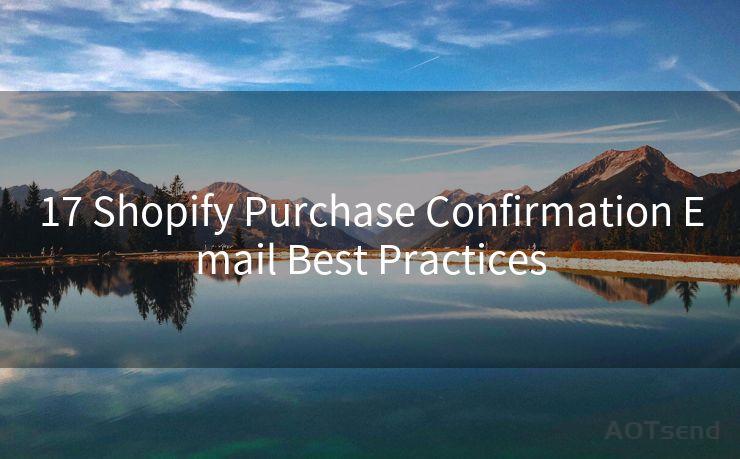17 Shopify Purchase Confirmation Email Best Practices




When it comes to e-commerce, Shopify stands as a leading platform, enabling merchants to sell their products online with ease. One crucial aspect of the online shopping experience is the purchase confirmation email. This email not only confirms the transaction but also serves as a touchpoint for building customer loyalty and trust. Here are 17 best practices for crafting effective Shopify purchase confirmation emails.
1. Clear Subject Line
Start with a clear and concise subject line that informs the customer about the content of the email. For example, "Your Order [Order Number] has been received!" This ensures the recipient knows immediately what the email is about.
2. Personalization
Use the customer's name in the greeting to add a personal touch. Personalization makes the email feel less automated and more human, enhancing the customer experience.
🔔🔔🔔
【AOTsend Email API】:AOTsend is a Managed Email Service for sending transactional emails. Support Email Types: reminders, authentication, confirmations, notifications, verification codes, invoices, password resets, account activations, billing statements, two-factor authentication (2FA), and one-time passwords (OTP) emails, etc. $0.28 per 1000 Emails. 99% Delivery, 98% Inbox Rate.
You might be interested in:
Why did we start the AOTsend project, Brand Story?
What is a Managed Email API, How it Works?
Best 25+ Email Marketing Platforms (Authority,Keywords&Traffic Comparison)
Best 24+ Email Marketing Service (Price, Pros&Cons Comparison)
Email APIs vs SMTP: How they Works, Any Difference?
3. Order Details
Include all the relevant order details such as order number, date, and a list of purchased items with their quantities and prices. This provides a quick overview and ensures transparency.
4. Payment and Shipping Information
Confirm the payment method used and provide shipping details, including the expected delivery date and tracking information, if available. This helps manage customer expectations.
5. Contact Information
Provide clear contact details, including customer service email, phone number, and/or live chat options. This gives customers a sense of security knowing help is available if needed.
6. Thank You Message
Always include a heartfelt thank you for the customer's trust and business. This simple gesture goes a long way in fostering goodwill.
7. Upsell and Cross-sell Opportunities
Use the confirmation email as an opportunity to introduce complementary products or services. However, be cautious not to overwhelm the customer with too many offers.
8. Social Media Links
Include links to your social media channels to encourage customers to connect with your brand on multiple platforms.
9. Refund and Return Policy
Briefly outline your refund and return policy, providing links to detailed information on your website. This prepares customers in case they need to make a return.
10. Feedback Request

Encourage customers to provide feedback on their shopping experience. This valuable input can help improve your services.
11. Mobile-Friendly Design
Ensure your email is optimized for mobile devices. With the majority of emails being opened on mobile, this is crucial for a positive customer experience.
12. Branding Consistency
Maintain branding consistency by using your brand's colors, logos, and typography. This reinforces brand recognition and trust.
13. Avoid Spam Filters
Be mindful of words and phrases that might trigger spam filters. Use plain language and avoid excessive capitalization or exclamation marks.
14. Call to Action
Include a clear call to action, whether it's to review the product, share on social media, or sign up for a loyalty program.
15. Legal Compliance
Ensure your email complies with relevant data protection and privacy laws, such as GDPR or CCPA, by including necessary disclosures.
16. Testing and Optimization
Regularly test and optimize your emails for deliverability, readability, and conversion rates. Use A/B testing to determine what works best for your audience.
17. Follow-Up Emails
Consider sending follow-up emails to check on customer satisfaction or to offer additional support. This proactive approach can lead to increased customer loyalty.
By implementing these best practices, you can turn your Shopify purchase confirmation emails into powerful marketing tools that enhance customer satisfaction and drive repeat business. Remember, every interaction with your brand is an opportunity to build trust and loyalty.




Scan the QR code to access on your mobile device.
Copyright notice: This article is published by AotSend. Reproduction requires attribution.
Article Link:https://www.mailwot.com/p2956.html



